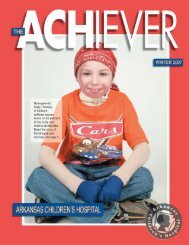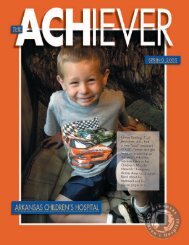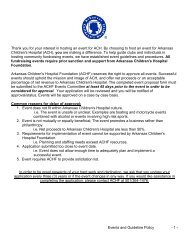facing life with a smile - Arkansas Children's Hospital
facing life with a smile - Arkansas Children's Hospital
facing life with a smile - Arkansas Children's Hospital
- No tags were found...
You also want an ePaper? Increase the reach of your titles
YUMPU automatically turns print PDFs into web optimized ePapers that Google loves.
RESEARCHDiabeteson the Rise:Dr. John Fowlkes helps care for thegrowing number of patients at ACH■ By Alyssa AndersonThe Division of Pediatric Endocrinology and Diabetesat <strong>Arkansas</strong> Children’s <strong>Hospital</strong> spends nearly 50 percentof its time and effort caring for children <strong>with</strong> diabetesand this commitment continues to rise sharply. With bothType 1 and Type 2 diabetes on the increase in kids,diabetes is potentially on its way to becoming thenumber one disease responsible for killing Americans.According to the American Diabetes Association,Type 1 diabetes is caused by the body’s failure to produceinsulin — the hormone that “unlocks” the cells ofthe body, allowing glucose to enter and fuel them. Thedisease usually begins during childhood and is commonlyreferred to as juvenile diabetes. Type 2 diabetes resultsfrom the body’s inability to make enough or properlyuse insulin, and it is usually associated <strong>with</strong> obesity. Asthe U.S. population becomes increasingly overweight,researchers expect Type 2 diabetes, which in the pastwas considered an adult disease, to appear more frequentlyin children.“We certainly know that the Center for DiseaseControl (CDC) has been able to document an increasein childhood obesity,” John Fowlkes, MD, chief of thedivision says, “and of those obese children who are predisposedto develop diabetes, many may demonstrateType 2 diabetes earlier in <strong>life</strong> because they get obeseearlier.”According to Fowlkes, diabetes is the number onecause for blindness, chronic renal failure and peripheralnerve dysfunction in America. So managing the diseaseand its complications is important...and can be expensive.He says the only way to address the disease isthrough a programmatic treatment plan. “It cannot be asimple doctor visit,” Fowlkes says. “It’s going to requireEndocrinologist Dr. Paul Frindik examines Emma Palmer,a diabetes patient, at the ACH specialty clinic in west LittleRock.<strong>life</strong>style changes, a lot of psychology, probably evenchanges in school lunch programs. We’ve already learnedfrom adult studies in Type 2 diabetes that the only effectivelong-term management consists of a multi-specialty team,which may include nurses, dietitians, physicians, and evenpsychologists, social workers and psychiatrists.”Fowlkes says research on Type 2 diabetes in children isstill in its early stages, but his feeling is that the studies maynot be that scientifically “exciting.”“I think what research is going to show us is that if youget kids who are prone to become obese early in <strong>life</strong> andput them in a boot camp-like environment which consists ofimproved eating habits and regular exercise programs, theywill lose weight and improve their health by staving off diabetes,”Fowlkes says. “But when you put them ‘back on thestreets,’ they’re going to get it again if they go back to theirold habits. This is not so much a medical conundrum as it isa societal, nutritional and environmental problem.”Despite the rise in Type 2 diabetes in children and thelarge amount of news coverage Type 2 is currently receiving,Fowlkes wants everyone to realize that approximately75-80 percent of the diabetes his department sees at<strong>Arkansas</strong> Children’s <strong>Hospital</strong> is Type 1. He says we can’tlose our focus on the fact that juvenile diabetes remains theprominent form of diabetes diagnosed in children.Part of that focus is on research happening right now at<strong>Arkansas</strong> Children’s <strong>Hospital</strong> Research Institute (ACHRI). Dr.Kathryn Thrailkill, associate professor of pediatrics, and hercolleagues are currently looking at the impact of Type 1 diabeteson bone development. She also recently received aNational Institutes of Health grant to start exploring howType 1 diabetes causes renal problems in children andadults.Dr. Paul Frindik, an endocrinologist at ACH, is working<strong>with</strong> child psychology to identify the psychological andContinued on page 84
















